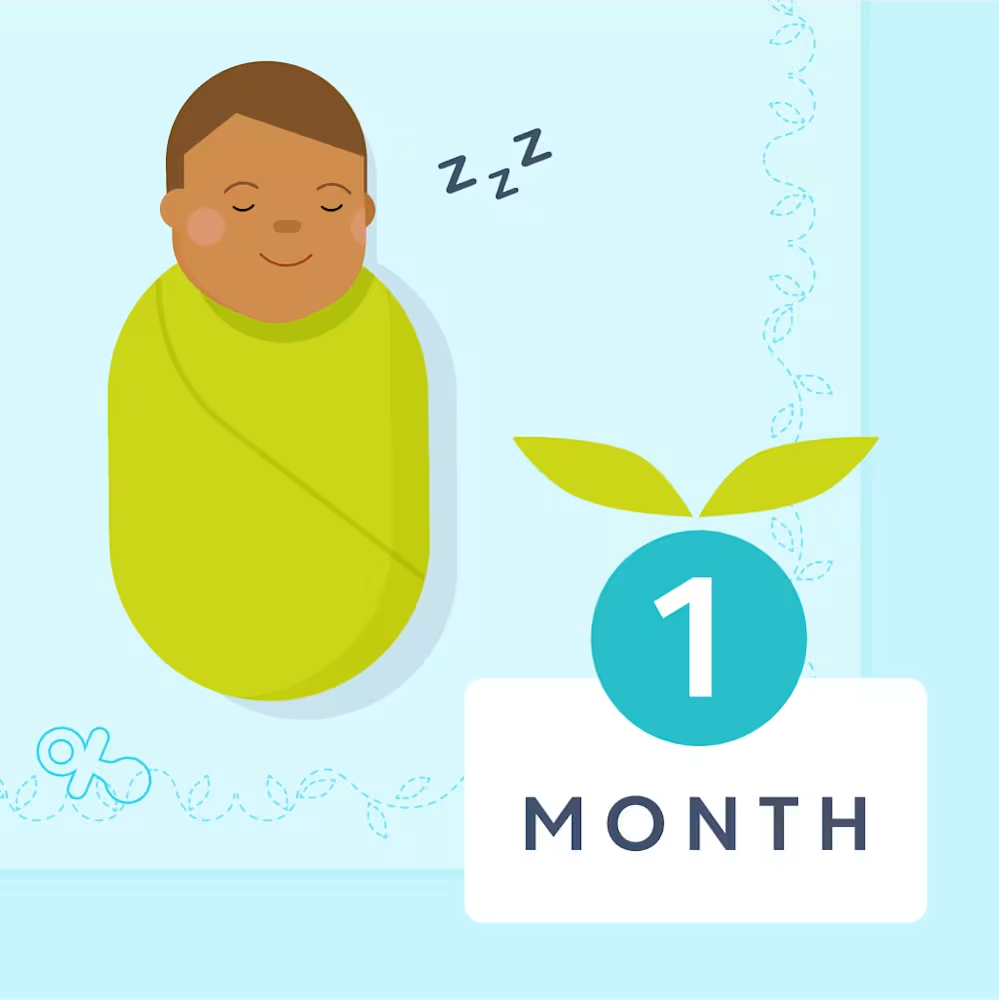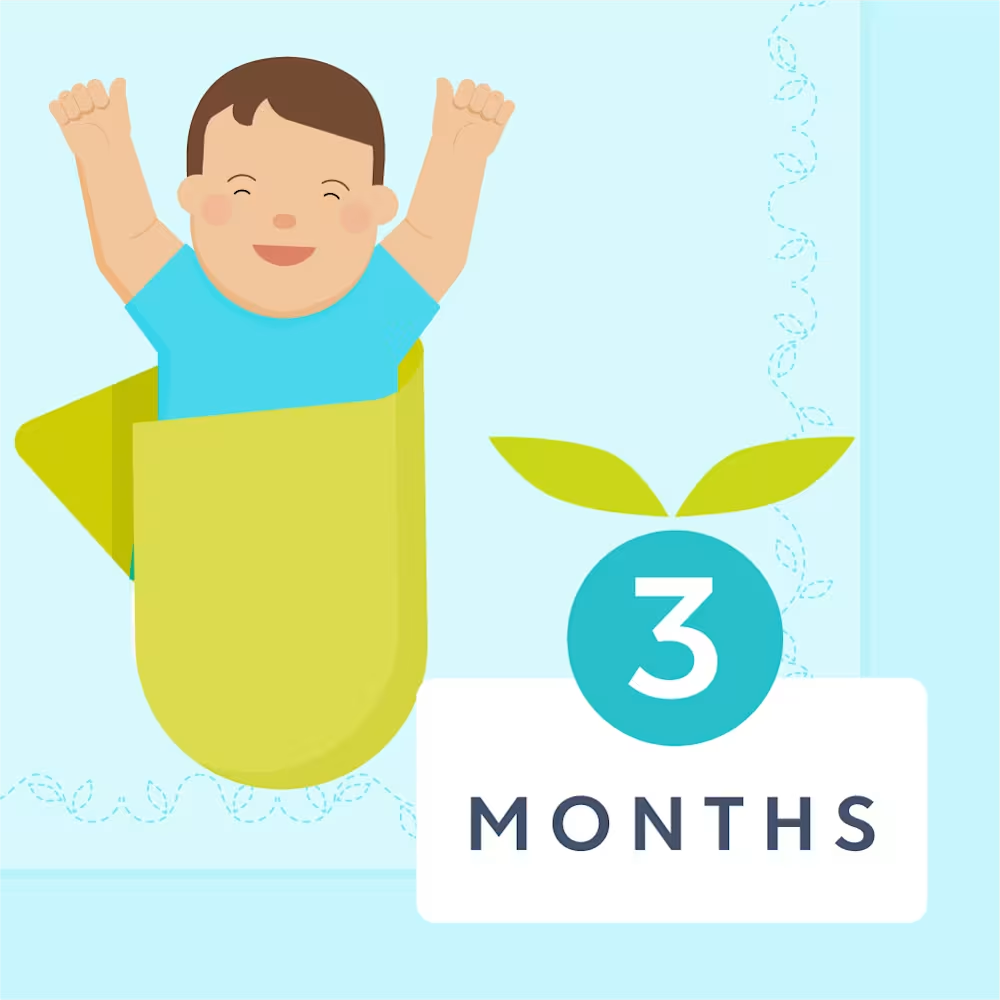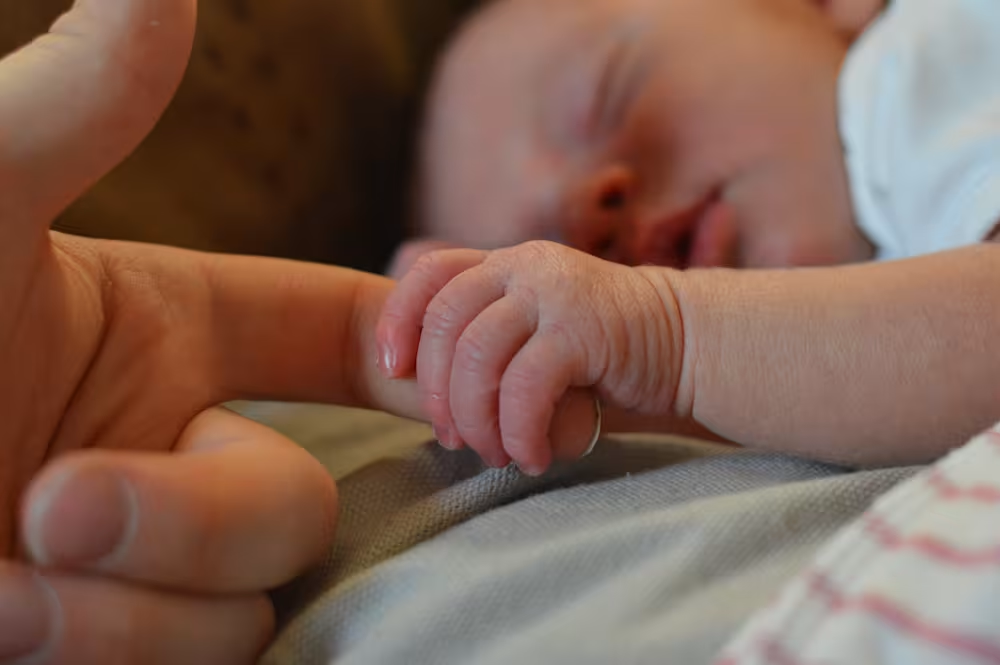2 month / 8 week old sleep schedule: Bedtime and nap schedule
Updated Dec 19, 2025

By 2 months of age, we expect day/night confusion to have passed and to see some longer periods of sleep at night. It’s common for days and nights to look very different from day to day since babies this age aren’t yet following a 24-hour internal rhythm [] for sleeping and eating.
How much should a 2 month old sleep?
At this age, we still hope to see about 15.5 hours of total sleep [] in a 24-hour period. However, the amount of sleep needed can differ between babies, and there is range of what's considered healthy and normal. It's important to take into consideration your child's mood and use the suggested hours as a general indicator rather than a goal to achieve.
We recommend aiming for 5 - 6 hours of daytime sleep, broken into 4 - 5 naps. It’s not often you will encounter a 2 month old baby not sleeping during the day, but if you suspect illness or a sleep regression, it can certainly affect how long they nap.
Here's a quick overview of what you may expect when it comes to 2 month olds and sleep. Note that these figures are averages and should be used as guidelines.
How long should a 2 month old sleep at night without eating?
This depends on your baby! At 2 months, we expect babies to wake at night to eat, but it will vary by child and your feeding schedule.
If you have questions, you should check with your baby’s pediatrician, since the doctor will be able to discuss their health history and best plan of action.
Sample sleep schedule for 2 month old
At 2 months, your little one's "schedule" will likely still be unpredictable. Sleep times and durations will vary and this is normal! Here's what a day in the life of a 2 month old newborn may look like:

2 month old nap schedule
How long should a 2 month old nap?
We don’t recommend trying to follow a set “schedule” at this age since nap durations will be unpredictable. Newborn naps tend to range anywhere from 10 minutes to 2 hours long (here are). If your baby sleeps for longer periods during the day, you can start to limit each individual nap to 2 hours to help consolidate night sleep and regulate their schedule. Ideally, they’ll get about 5 - 6 hours of total daytime sleep.
How many naps for a 2 month old?
Most 2 month old babies need 4 - 5 naps per day. How many naps your baby will take each day depends on the length of the naps and the amount of awake time between sleep periods. Two month olds usually need 45 minutes - 1.75 hours of awake time between sleep periods.
We don’t expect much predictability at this age [], and it’s common for naps to vary quite a bit. Although this can be frustrating for parents, short, unpredictable naps are a fact of life at this age. Here are some examples of what your baby’s day could look like, though don’t be worried if your days look quite different:
5-nap schedule for 2 month old
4-nap schedule for 2 month old
Can you sleep train a 2 month old?
We don’t recommend official at this age. Newborns have an immature sleep-wake system, which means sleep patterns and rhythms can be unpredictable and babies often need more help falling asleep. Families who attempt sleep training at this age are often frustrated by the lack of progress and the amount of crying.
However, you can certainly give your baby opportunities to fall asleep in their sleep space from an “awake but drowsy” state, rather than place them down when they’re already asleep. Aim to practice after a calm when your baby is fed, dry, and healthy. If the attempt is stressful for you or your baby, you can always try again another day — or when your baby is a bit older.
Top sleep tips for 2 months old
To help your 2 month old sleep longer (and better), here are some tips to keep in mind:
Plan naps with two factors in mind: your baby’s sleepy cues and.
Pay attention to sleep cues. When your baby starts getting quiet and/or still, stares off into space, or lays their head down on you, those are signs that they’re ready to sleep.
Stick with on-demand feeding for now. If your baby wakes up hungry, filling their belly can help them get back to sleep.
Day/night confusion may be subsiding at this time, but you’re likely still dealing with a fairly unpredictable sleep schedule.
At this point, a 2 month old wake window may be a mere 45 minutes to 1.75 hours. Using our feature can help predict optimal nap times for your baby.
Bedtime for a 2 month old
What time should a 2 month old go to bed?
It’s common for bedtimes to still be pretty late at this age (often after 9:00 PM). Your baby’s bedtime will be determined by the time they woke up that morning [] and how many naps they took that day. As your baby’s internal clock matures, bedtime tends to gravitate earlier — this tends to happen between 3 and 4 months of age.
Can a 2 month old baby sleep through the night?
We expect babies this age to wake during the night for feedings and comfort. Consult with your pediatrician and/or lactation consultant if you have questions regarding the appropriate amount of night feedings for your 2 month old.
Why does my 2 month old keep waking up at night crying?
At 2 months, your baby may be able to sleep some longer stretches at night. However, night waking is still developmentally appropriate as newborns continue to wake for hunger and comfort.
Is there a sleep regression at 2 months old?
Newborn sleep is characteristically unpredictable, so frequent waking and short naps at this age are normal — we wouldn’t call this phase of chaotic sleep a “sleep regression.” Your baby may even be sleeping a little better at 2 months as has likely resolved (or will soon), which leads to some babies being able to sleep for longer periods overnight.
Can my 2 month old sleep with a pacifier?
Pacifiers can be offered to your baby at 2 months, though not every baby will take one. The AAP recommends using pacifiers during sleep times to provide comfort and reduce the risk of sudden infant death syndrome (SIDS) []. Pacifier use is also frequently recommended for low-birth weight or preterm babies to help develop their sucking reflex [].
However, the AAP cautions against using a pacifier to replace (or delay) breast milk or formula feedings.
Should I swaddle my 2 month old?
You can continue to swaddle your baby to help them feel secure at 2 months as long as they’re not showing any signs of rolling, which may be around this time for some little ones []. There are also if your baby is trying to roll or has resisted a traditional swaddle. Examples include transitional swaddles and sleep sacks, which provide comfort like a swaddle but don’t restrict a child’s arms, making them safe for sleep.
Can a 2 month old sleep on their stomach or side?
At 2 months, babies should always be placed on their backs for sleep, not their stomachs or sides. According to the AAP’s safe sleep guidelines [], once your baby can roll both ways on their own (back to front and front to back), you don’t need to return them to their backs if they roll over in their sleep.
What are the developmental milestones for a 2 month old?
, your baby may be trying out some new skills like pushing their hands up during tummy time and smiling at the sight of your face. However, keep in mind there’s a range of normal for developmental milestones — most children will be trying these things by 12 months, but not all. If you have concerns about your child’s growth or any potential development delays, contact their healthcare provider:
Holds head up briefly when on tummy
Begins to push up on hands during tummy time
Moves arms and legs more smoothly
Makes cooing noises
Briefly opens or relaxes hands
Cries to communicate most needs
Smiles at your face and seems happy to see you
Looks toward loud noises
May put hand to mouth
Does a 2 month old need to eat during the night?
If you're wondering , know that some babies at 2 months may be able to sleep longer stretches at night as day/night confusion subsides. This depends on the baby and their feeding schedule. However, it’s still developmentally expected for 2 month olds to wake up hungry overnight. Babies also commonly go through around 3 months, which may lead to increased hunger.
We recommend continuing to feed your baby on demand at this age and consulting with your little one’s pediatrician if you have questions about how much they should be eating at night.
Takeaway
Aim for about 15.5 hours of total sleep in a 24-hour period, with 5 - 6 hours of daytime sleep broken into 4 - 5 naps. The key is to be flexible, understanding that sleep patterns are evolving, and each baby is unique.
Naps at 2 months can range from 10 minutes to 2 hours. Most babies need 4 - 5 naps per day, with 45 minutes to 1.75 hours of awake time between sleep periods.
Official sleep training isn't recommended at this age due to the immature sleep-wake system. However, create opportunities for your baby to fall asleep in their sleep space after calm bedtime rituals.
Bedtimes at this age can be late, often after 9:00 PM. Bedtime will be determined by the morning wake-up time and the number of naps.
Expect babies to wake during the night for feedings and comfort. Consult with healthcare professionals for guidance on nighttime feedings.
If you're curious about what lies ahead in the coming month, glimpse into the future to see what you might experience when your little one is on a . Also check out what to expect regarding over the course of their first year and look back at !
Share article:
Note: The content on this site is for informational purposes only and should not replace medical advice from your doctor, pediatrician, or medical professional. If you have questions or concerns, you should contact a medical professional.
9 Sources
Share article:






